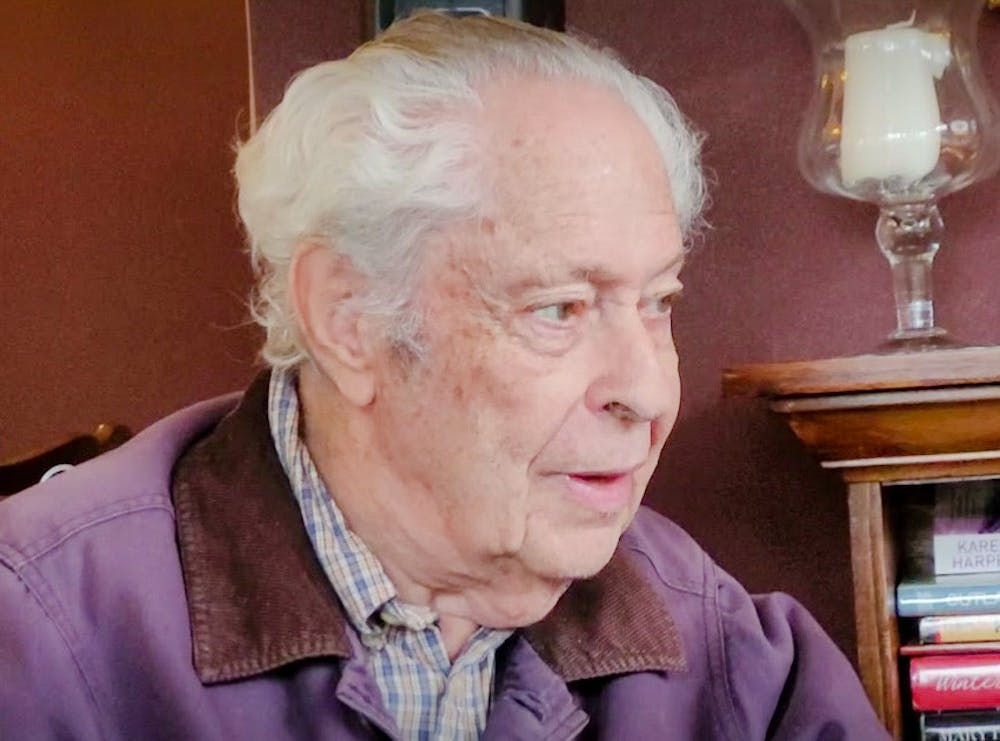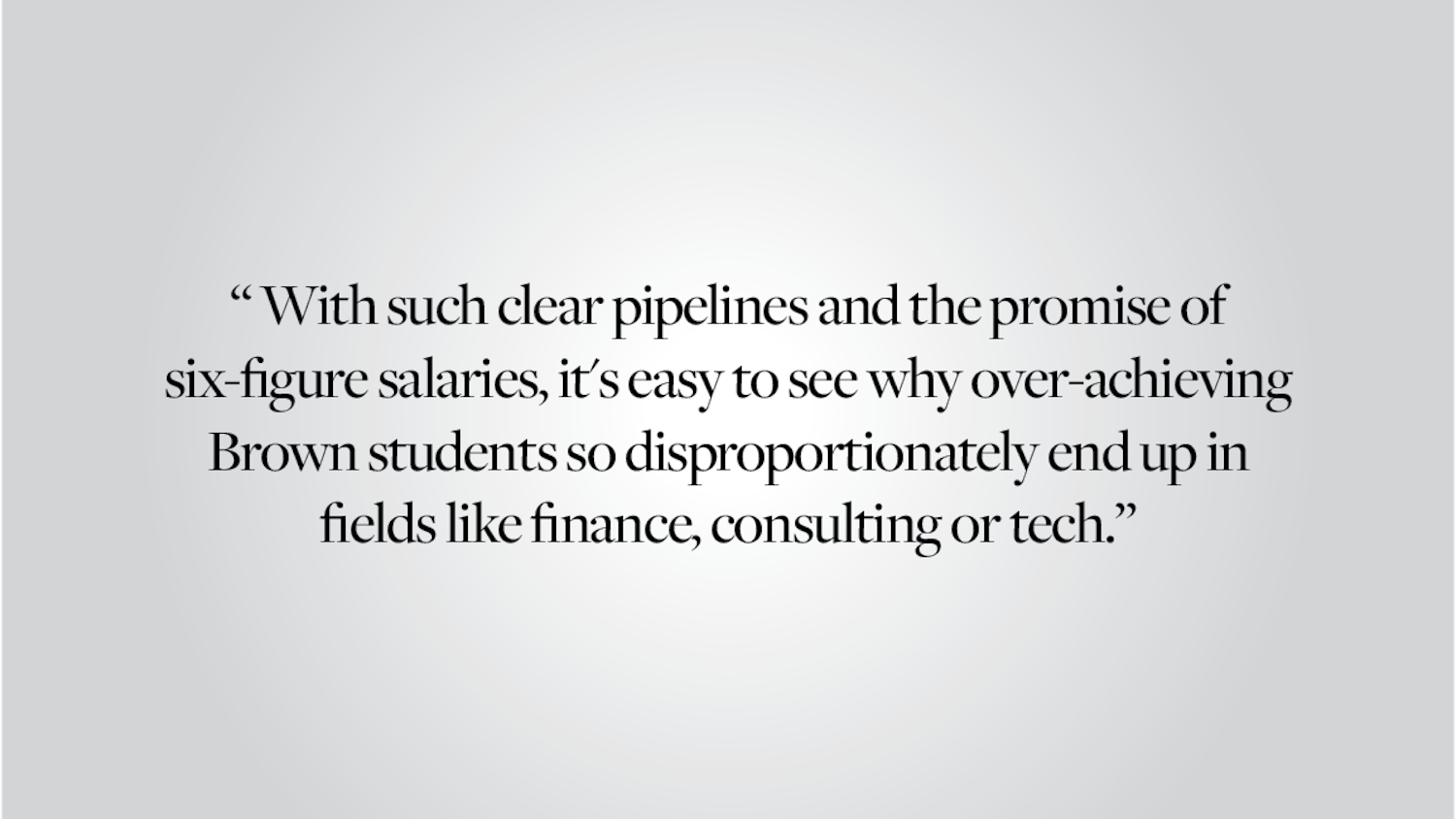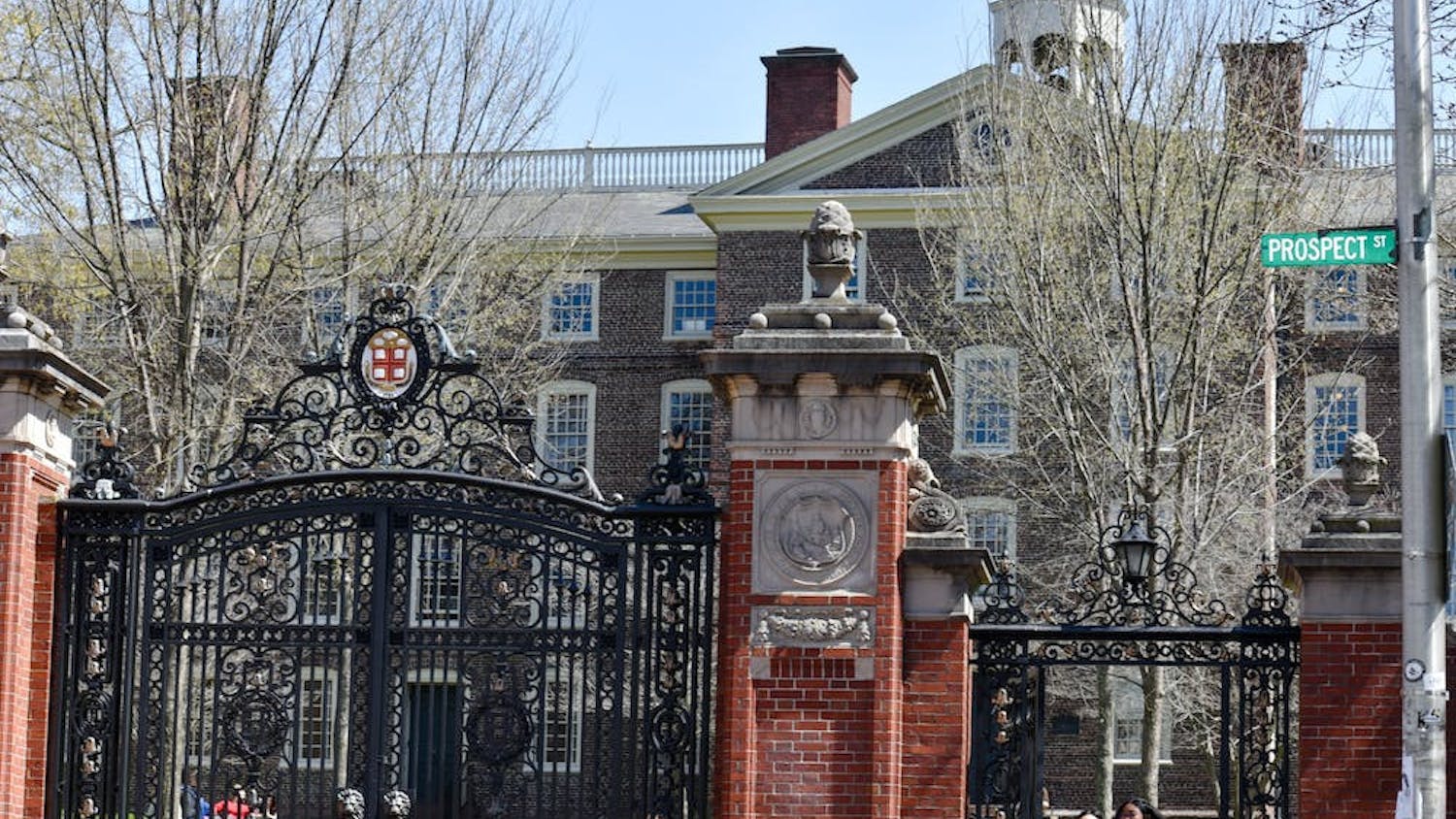George Morgan, an accomplished professor emeritus at the University and a pioneer of Brown’s renowned open curriculum, died Feb. 4 at age 98.
Morgan, born in Vienna, Austria, is survived by his daughter Alexandra Morgan ’84, his grandchildren Benjamin and Madelin and his step-grandson Raymond. George Morgan, an Austrian Jew, fled Vienna at age 14, weeks before Kristallnacht. George Morgan went on to join the University as an applied mathematics professor in 1950.
During his time at Brown, George Morgan earned a reputation as an innovative, kind and trailblazing professor who introduced the idea of interdisciplinary study to a University that would come to be defined by the concept. His work inspired student and faculty leaders who advocated for a more flexible curriculum in the late 1960s. Two of his students, Elliot Maxwell ’68 and Ira Magaziner ’69, successfully executed a Group Independent Study Project that proved vital to breathing life into the celebrated open curriculum.
George Morgan was eventually named a “University Professor” untethered to a singular department, according to a Brown Alumni Magazine article. He also made key contributions to fields beyond applied mathematics, including medicine, physics and hydraulic engineering, his daughter Alexandra Morgan said.
A 1970 article in The Herald put it simply: “In the beginning, there was George Morgan.”
Morgan’s courses, the article said, attempted to provide students with the “chance to integrate (their) understanding of the various intellectual disciplines and to establish meaningful relations among the diverse forms of human intellectual experience.”
“One year ago this spring,” the article reads, discussing the open curriculum’s implementation, “Brown University recognized that George Morgan was right.”
In the months following his passing, The Herald spoke with several of George Morgan’s former students, friends and family members, who said he left behind both a transformative career that allowed students to pave new paths to success, but also a lasting memory of intimate personability, intellectual curiosity and warm acceptance of all.
Interdisciplinary studies and academic mentorship
In 1958, George Morgan proposed a course titled “Modes of Experience: Science, History, Philosophy and the Arts” to University President Barnaby Keeney — one of the first “University Courses in Interdisciplinary Studies.” The courses offered students the chance to explore academics from different angles — creating the ethos that characterizes Brown today.
But the connections he drew impacted more than the University’s learning environment — they shaped lives, former students and colleagues said.
Janet Cooper Nelson, chaplain of the University and George Morgan’s longtime colleague, said he made students feel seen and valued.
Cooper Nelson said that for Kate Frank ’60, George Morgan was the “first person who made her feel like what she had to say was important.”
“He looked at her and said, ‘I don’t know if you understand just how important your ideas are, and I really want to hear more of them,’” she said.
“Kate said that no one had ever welcomed her in that way,” Cooper Nelson added.
Frank, who met George Morgan in her sophomore spring while interviewing for a spot in his class, said that his teaching convinced her she could succeed in math and unlocked a new way of viewing mathematical inquiry.
“I’ve never known someone with such a depth of listening,” she said. “I didn’t have to hide my serious side. And I developed ideas and had experiences, even with scientific material, that I would not have ordinarily engaged with because I had already decided that I couldn’t.”
Another student of George Morgan, Fred Marchant ’68, remembers going through the same selection process as Frank in order to earn a seat in one of his renowned classes.
“I really loved talking with him,” Marchant said. “I don’t remember what we said, but I remember it being a meaningful conversation …which I always found with George.”
Through George Morgan, Marchant was introduced to what it meant to be an interdisciplinary academic.
“Here was a man who was an applied mathematician, raising ethical questions about 20th-century literature and art, as well as philosophy and social sciences,” he said. “George conveyed over the course of a couple years that there were these profound human questions that didn’t fall neatly into disciplinary categories.”
That type of big-picture thinking later became a principle of Marchant’s life’s work as a teacher “across disciplines … in a variety of contexts,” he said, citing the interdisciplinary graduate program he was a part of while studying at the University of Chicago and his penchant for teaching English courses that incorporated history and philosophy.
Moral compass and core values
Marchant also shared that George Morgan’s teachings influenced the development of his own moral compass, recounting an experience he had as a lieutenant in the U.S. Marine Corps in 1968.
“I was in a position on Okinawa to be sent to Vietnam,” he said. “And that was the same time as the Mỹ Lai Massacre … where 500 civilians were slaughtered. And the revelations of that came about and I said to myself ‘I’m not staying. I did not join to commit atrocities.’”
This led Marchant on a months-long journey that concluded with him becoming honorably discharged as a conscientious objector.
“Every step along the way,” Marchant said, “George Morgan was with me.”
“George Morgan had a more significant positive influence on Brown as an institution than any other professor in Brown’s history,” said Jeff Bercuvitz ’84, who similarly felt that George Morgan played a key role in shaping his values.
“Professor Morgan was clear that at least a critical part of a university education is to humanize us — to help us feel, to connect, to make meaning, to grow as a person,” Bercuvitz explained. “And at the same time, do the essential and often dangerous work to create a more just, peaceful world.”
Family memories and unconditional love
According to Bercuvitz, who maintained a close relationship with Morgan and his wife, Barbara, post-graduation, “you can’t understand or appreciate George Morgan without understanding George and Barbara Morgan.”
Through George and Barbara Morgan’s relationship, Bercuvitz could see love as something gentle and unconditional.
Bercuvitz recounted George and Barbara Morgan scouting out their burial plots while still in good health. “They’re walking on Blackstone Boulevard — they were big walkers, they knew everyone in the neighborhood those days — and they lay down together, holding hands and looking up to try and imagine their perspective from their graves,” he said.
“After Barbara passed (in 2009), George was never really able to experience quite the same level of joy,” Bercuvitz added. “It showed me what it meant to really love your partner.”
Bercuvitz noted that the Morgans’ relationship also reached George Morgan’s students: “They always had people over in their home, and we would have these amazing conversations,” he said. “And it really meant something to those generations of students … (who) came out only to George and Barbara as gay and lesbian, and found some of the only people on campus who could affirm them as who they were.”
Alexandra Morgan told The Herald that her childhood was framed by these close relationships her family developed with Brown students. Born an only child, she remembers her father’s students as “these big brothers and big sisters.”
Alexandra Morgan was grateful her parents “never excluded” her from those lively environments: Years of “grown-up talk” taught her “academic concepts and the ideas and names of authors and thinkers.”
Alexandra Morgan recalled her father often playing the grand piano during these gatherings. “I would come in with my blankets and pillows and curl up under the piano to listen as they spoke,” she shared. “If my mother told me I really had to go up and go to bed, I’d sometimes sneak back down and sit on the landing next to the living room so I could still hear their music and their voices.”
She remembered her father as a wonderful piano player, a thoughtful art consumer and an endearingly hapless chef: She didn’t realize her father “couldn’t cook until after my mother died because he was always in the kitchen, helping her.”
Advocacy and ‘doing the right thing’
After a meal, Alexandra Morgan remembers how her father would always accompany her mother to the kitchen, arms stacked with dishes, while the rest of the men sat in the living room, drinking and smoking cigars.
“People would say ‘no, no, no, that’s okay, the women will do it,’ and he said, ‘I ate the food off of these plates. Why shouldn’t I help?’”
Alexandra Morgan also recalled her father joining in on various forms of student advocacy during his time on campus.
One day in the early 1960s, University students were rallying to take a bus to march with Dr. Martin Luther King Jr. in the Civil Rights Movement.
Alexandra Morgan said that several of her father’s students planned to join in on the protests, but that it was shaping up to be “a very dangerous march.”
While George Morgan was unable to attend the march, he was there to see his students off at 3 a.m. “They were just so shocked,” Alexandra Morgan said. “And my father shook hands with his students and said, ‘You’re doing the right thing.’”
Today, George Morgan’s legacy is carried on by dozens of former students, friends and colleagues. Through weekly Zoom meetings, affectionately referred to as “Morgan Salons,” the group — self-labeled “Morganizers” — ensure that George Morgan’s legacy endures through discussions of life, poetry and memories of the man who brought them all together.
Bercuvitz urged students to contact Cooper Nelson if they wish to learn more about George Morgan and connect with a wide alumni network “of the Morgan community.”
“Professor Morgan certainly had a greater influence on my thinking and my life than any other person,” said Bercuvitz, who noted that at Morgan’s 95th birthday celebration — a gathering of almost 100 people — dozens of attendees echoed the same sentiment.
“He changed not only the lives of a lot of individuals,” Bercuvitz said, “but many of George’s students went forward to create or transform fields of their own and have made meaningful differences in the lives of thousands of others.”

Sofia Barnett is a University News editor overseeing the faculty and higher education beat. She is a junior from Texas studying history and English nonfiction and enjoys freelancing in her free time.





